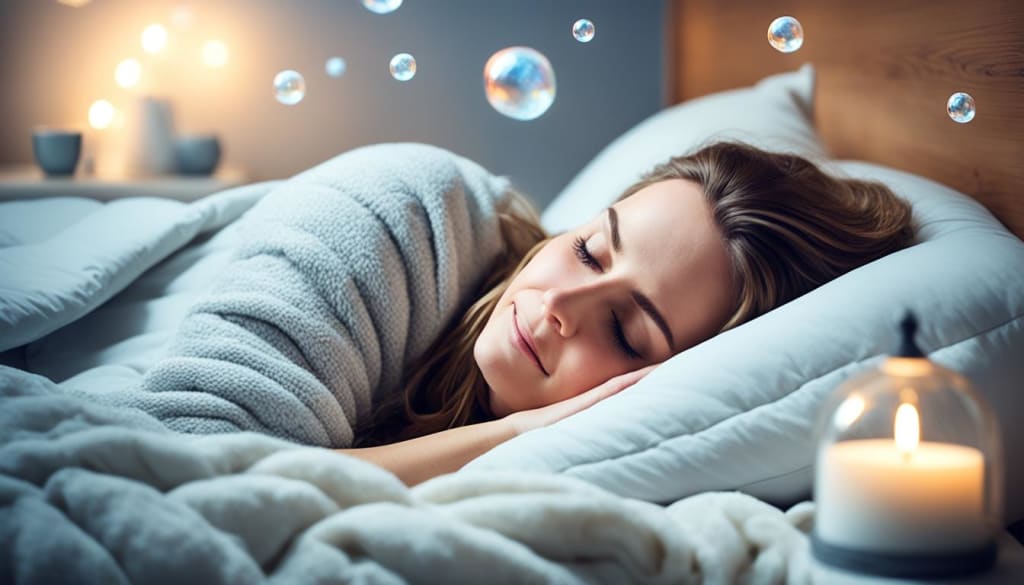Unlock the Secrets of Better Sleep Tonight
A good night's sleep is essential for optimal health, and diet and exercise play a crucial role in achieving that.

By making small, sustainable changes to your lifestyle, you can unlock the secrets to better sleep and improve your overall well-being.
Tossing and turning, staring at the clock, and waking up feeling more tired than before - these are common problems. But, the secret to good sleep is easy to find. I used to struggle with sleep, but I found ways to fix it. Now, I sleep well and feel great.
Principal Learnings
Discover the importance of high-quality sleep and its benefits for your overall health
Learn how to create a sleep-friendly environment that promotes relaxation and restfulness
Uncover strategies for establishing a consistent sleep routine and winding down before bedtime
Identify and address common sleep disorders to improve your sleep quality
Explore the role of diet, exercise, and stress management in achieving better sleep
Understanding the Importance of Quality Sleep
Getting good sleep is key for your health and happiness. Not sleeping well can hurt your body and mind. So, make sure to get 7–9 hours of sleep each night.
How Lack of Sleep Affects Your Health
Not sleeping enough can make you less sharp. It hurts your memory, focus, and how you make decisions. It also weakens your immune system, making you more likely to get sick.
Also, not sleeping well can lead to serious health problems. These include heart disease, diabetes, and obesity.
Are you prepared to make tonight's sleep better? Get the sleep aid we suggest by clicking this link.
The Benefits of Getting Enough Rest
But, sleeping well has many good things to offer. It makes you feel happy, gives you more energy, and helps you think better. Quality sleep is key for keeping your mind and body in top shape.
It also helps with remembering things and keeping your body's clock in check. This is important for staying healthy in body and mind.
Also, REM sleep is important for feeling good, remembering things, and keeping your brain healthy. Making sleep a priority can lead to a better life, more work done, and better health.
Creating a Sleep-Friendly Environment
Your sleep space is key to good rest. Make it comfy with the right temperature, lighting, and noise. This helps with sleep hygiene and keeps your circadian rhythm in check.
Temperature matters a lot. Your bedroom should be between 65°F and 70°F (18°C and 21°C). Too hot or cold can mess up your melatonin levels and make you wake up a lot.
Light affects sleep too. Bright lights, like from screens, can stop melatonin from working right. Use blackout curtains or an eye mask to keep it dark.
- Keep your bedroom cool and comfy.
- Stay away from bright lights and blue light before bed.
- Make your bedroom quiet for better sleep.
Fixing these things helps you sleep better and feel good. It's key for your health.
"Creating a sleep-friendly environment is crucial for promoting better sleep and supporting your body's natural circadian rhythm."
Establishing a Consistent Sleep Routine
Making a regular sleep plan is key to good sleep habits. A steady sleep cycle helps your body's internal clock work better. It also makes your sleep better. A great way to keep a steady routine is to calm down before bed.
The Power of Winding Down Before Bedtime
As night comes, it's important to do relaxing things to get ready for sleep. You might read a book, take a warm bath, or try melatonin-boosting napping methods. Doing these things slowly helps your brain know it's time to sleep.
Do calming things like reading, gentle stretching, or light meditation.
Stay away from bright screens and devices because the blue light can mess with your circadian rhythm.
Make your bedroom comfy by fixing the lights, temperature, and noise.
Keep your bedtime and wake-up time the same every day, even on weekends, to help your body's sleep hygiene.
Putting a priority on a steady sleep plan and calming down before bed can lead to better sleep. This whole approach to sleep hygiene can greatly improve your health and happiness.
"The key to better sleep is to establish a consistent routine that helps your body recognize when it's time to wind down and rest."
Identifying and Addressing Sleep Disorders
Good sleep is key for our health and happiness. But some people have trouble sleeping that needs a doctor's help. Knowing about common sleep problems and their signs is the first step to getting better sleep.
Common Sleep Disorders and Their Symptoms
Insomnia is a big sleep problem. It makes it hard to fall asleep, stay asleep, or wake up on time. People with insomnia feel tired, grumpy, and can't focus during the day.
Sleep apnea is another big issue. It happens when you stop and start breathing a lot during sleep. This makes sleep broken and restless.
Restless leg syndrome makes you want to move your legs a lot. You might feel uncomfortable too. This can make it hard to sleep and you'll feel tired all day.
Narcolepsy is less common but serious. It makes you very sleepy during the day and you might fall asleep suddenly.
It's important to know the signs of these sleep problems. Then you can get the right help from a doctor. They can check you out, suggest the best treatments, and help you sleep better.
"Quality sleep is not just a luxury, but a fundamental necessity for optimal health and well-being."
Sleep Stages and Cycles
Getting good sleep is more than just sleeping for a few hours. The human sleep cycle is complex and important for our health. Knowing about the different sleep stages helps us sleep better and feel refreshed.
The sleep cycle has many stages, each with its own purpose. The first stage, non-rem sleep, helps the body relax. It slowly moves from being awake to being asleep. Then comes the rem sleep stage, where dreams happen and the brain is more active.
Rem sleep is very important. It helps us remember things, feel good, and think clearly. Not getting enough rem sleep can make learning hard, make us feel sad, and hurt our thinking skills over time.
The circadian rhythm is our body's clock that tells us when to sleep and wake up. It's helped by the hormone melatonin. This hormone tells our body when it's time to sleep and when it's time to be awake.
Sleep Stage Duration Key Characteristics Non-REM Stage 1 5–10 minutes Transitional phase from wakefulness to sleep Non-REM Stage 2 10–25 minutes Brain activity and muscle relaxation continue to decrease Non-REM Stage 3 20–40 minutes Deepest and most restorative stage of non-REM sleep REM Sleep 90–120 minutes Brain activity increases, vivid dreams occur, and muscles become temporarily paralyzed
Learning about sleep cycles and circadian rhythms helps us sleep better. It lets us make smart choices about our sleep. This can make us feel better physically and mentally.
The Role of Diet and Exercise in Better Sleep
Getting good sleep is more than just going to bed at the same time every night. What you eat and how active you are also affects how well you sleep. By knowing how food, exercise, and sleep are connected, you can make choices that help you sleep better
About the Creator
Enjoyed the story? Support the Creator.
Subscribe for free to receive all their stories in your feed. You could also pledge your support or give them a one-off tip, letting them know you appreciate their work.





Comments (1)
Then I will have a better sleep tonight.